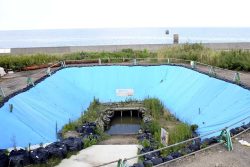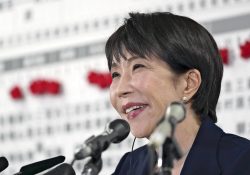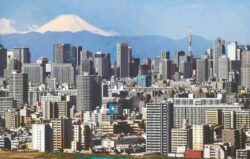Nuclear Waste Disposal: Final Site Should be Selected from as Many Candidates as Possible
15:46 JST, September 29, 2023
The selection of a site for the final disposal of high-level radioactive waste from nuclear plants is a long and difficult process. It is necessary to increase the number of municipalities that would consider hosting the site so that the central government can choose a final disposal site from as many candidate municipalities as possible.
The Tsushima city government in Nagasaki Prefecture has decided not to apply for a “literature survey” to examine whether the city is suitable for the construction of a final disposal site. Mayor Naoki Hitakatsu gave his reasons at a press conference, saying that “a sufficient consensus has not been reached among our residents” and “damage could be expected to the tourism industry due to harmful rumors.”
The city assembly had adopted a petition calling for acceptance of the survey, and the mayor made a decision that runs counter to this. It can be said that the mayor’s stand made it clear that the local government is struggling with a controversial issue, on which there are differing opinions.
Literature surveys are currently underway in the town of Suttsu and the village of Kamoenai, both in Hokkaido. If Tsushima had joined them, it would have been the third such municipality. It had been attracting attention that discussions over the construction of a final disposal site were expected to cover wider areas, not only in Hokkaido but also in the rest of the country. However, with Tsushima’s withdrawal, there is concern that applications from other municipalities will stall.
The final disposal site is envisioned as a facility in which the last remaining waste from nuclear fuel used at nuclear power plants would be enclosed in double- or triple- layered containers and buried in a stable geological formation more than 300 meters underground.
A literature survey will be conducted over a period of about two years to check the suitability of each candidate site, based on documents and data. The next stage, a preliminary investigation, will last about four years, involving surveys that use boring and other techniques.
At each stage, there is a mechanism to hear the opinions of the prefectural governor and the mayor of the municipality, and it is possible to renounce a candidacy in the middle of the process. Acceptance of a literature survey does not necessarily mean that construction will follow.
In the course of the screenings, it may turn out that candidates are not suitable as a construction site. The more candidate sites there are, the likelier it is that an ideal construction site will be found. It is desirable to select the most suitable site for a final disposal site from among many candidate sites.
In Finland and Sweden, the number of candidate sites was narrowed down gradually from six and eight, respectively, before a site was finally chosen. If more than one municipality declares a bid to host the facility, the pressure on individual municipalities may be reduced.
There is concern that a community could become divided over the construction of a final disposal facility between those in favor of the construction and those opposed. However, a final disposal site is certainly necessary for a country that uses nuclear power plants. It is necessary to facilitate the selection of a suitable site at an earlier stage.
The central government and the Nuclear Waste Management Organization of Japan, which is in charge of the final disposal site, must repeatedly explain the necessity and safety of the facility in various parts of the country to broaden understanding.
They also need to encourage local governments to make the decision by introducing the examples of foreign municipalities that have been chosen to host such facilities.
(From The Yomiuri Shimbun, Sept. 29, 2023)
Top Articles in Editorial & Columns
-

40 Million Foreign Visitors to Japan: Urgent Measures Should Be Implemented to Tackle Overtourism
-

University of Tokyo Professor Arrested: Serious Lack of Ethical Sense, Failure of Institutional Governance
-

AI, Initially a Tool, is Evolving into a Partner – But is it a Good One?
-

Greenland: U.S. Territorial Ambitions Are Anachronistic
-

Policy Measures on Foreign Nationals: How Should Stricter Regulations and Coexistence Be Balanced?
JN ACCESS RANKING
-

Japan Institute to Use Domestic Commercial Optical Lattice Clock to Set Japan Standard Time
-

China Eyes Rare Earth Foothold in Malaysia to Maintain Dominance, Counter Japan, U.S.
-

Man Infected with Measles May Have Come in Contact with Many People in Tokyo, Went to Store, Restaurant Around When Symptoms Emerged
-

Japan, Qatar Ministers Agree on Need for Stable Energy Supplies; Motegi, Qatari Prime Minister Al-Thani Affirm Commitment to Cooperation
-

Australian Woman Dies After Mishap on Ski Lift in Nagano Prefecture



















